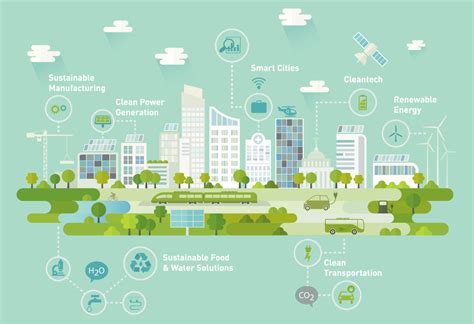As the demand for sustainable solutions continues to grow, so does the need for engineers equipped with the knowledge and skills to address environmental and societal challenges. American universities have been at the forefront of integrating sustainability into their engineering curricula, offering a range of programs focused on sustainable engineering. In this blog post, we will explore the various aspects of sustainable engineering programs in American universities. From the integration of sustainability in engineering curricula to the importance of interdisciplinary collaboration and the promotion of diversity and inclusivity, we will delve into the key components that make these programs successful. We will also examine case studies of impactful sustainable engineering projects, as well as the research and innovation driving the field forward. Additionally, we will discuss the role of partnerships between universities and industry in fostering sustainable solutions, and the importance of engaging students through practical projects and extracurricular activities. Join us as we explore how American universities are building a long-term strategy for sustainable engineering education.
Table of Contents
Growing demand for sustainable engineering programs
In today’s rapidly changing world, there is a growing demand for sustainable engineering programs as societies recognize the need for environmentally-friendly and socially responsible solutions to complex engineering challenges. As the effects of climate change become more apparent, there is an increasing emphasis on the development of sustainable infrastructure, energy systems, and resource management strategies. This shift in priorities has led to a surge in interest in sustainable engineering education at the university level.
With more and more industries seeking to reduce their environmental impact, the demand for engineers with expertise in sustainable practices is on the rise. Graduates from sustainable engineering programs are well-positioned to contribute to the development of renewable energy technologies, green construction methods, and waste reduction initiatives. This skillset is becoming increasingly valuable in the global job market, driving the demand for sustainable engineering education.
Furthermore, as consumers become more conscious of the environmental and social implications of the products they use, there is a greater need for engineers who can design and implement sustainable solutions. Companies are looking for professionals who have a deep understanding of sustainable principles and can help them meet the expectations of environmentally-conscious consumers. Therefore, there is a strong incentive for universities to offer comprehensive sustainable engineering programs to meet the demands of both students and employers.
In conclusion, the growing demand for sustainable engineering programs is a result of the increasing awareness of the importance of sustainability in the field of engineering. As the need for sustainable solutions continues to grow, so does the need for skilled professionals who can lead the way in creating a more sustainable future for all.
Integration of sustainability in engineering curricula
In today’s rapidly changing world, it has become crucial for engineering curricula to integrate sustainability into their programs. Sustainability is no longer a niche concern, but rather a global imperative that impacts every sector, including engineering. Therefore, it is essential for engineering students to have a deep understanding of sustainability principles and practices as part of their education.
By incorporating sustainability into engineering curricula, universities can prepare the next generation of engineers to address pressing environmental and social challenges. This integration can take various forms, including dedicated courses on sustainable engineering, the inclusion of green design principles in traditional engineering courses, and opportunities for hands-on experience with sustainable technologies.
Furthermore, the integration of sustainability in engineering curricula can also help students develop a holistic understanding of complex systems and the interconnectedness of social, environmental, and economic factors. This interdisciplinary approach is essential for engineers to develop innovative solutions that are not only technically sound but also environmentally and socially responsible.
Ultimately, by integrating sustainability into engineering curricula, universities can play a vital role in fostering a new generation of engineers who are not only technically proficient but also committed to creating a sustainable future for all. This not only benefits the students and the engineering profession but also has positive ripple effects for society and the planet as a whole.
Partnerships between universities and industry for sustainable solutions
Partnerships between universities and industry play a crucial role in driving sustainable solutions to address complex global challenges. These collaborations bring together the expertise and resources of academia and industry to develop innovative and practical solutions that contribute to environmental, social, and economic sustainability.
By establishing partnerships, universities can leverage the knowledge and research capabilities of their faculty and students, while industry can provide real-world insights and resources to support the implementation and scalability of sustainable solutions.
This collaboration can take various forms, including joint research projects, internships and co-op programs, industry-sponsored workshops, and mentorship programs. These partnerships not only benefit the involved institutions but also have a broader impact on the community by fostering the development and adoption of sustainable practices and technologies.
Ultimately, partnerships between universities and industry for sustainable solutions play a pivotal role in addressing global sustainability challenges and preparing the next generation of professionals to drive positive change in the world.
Case studies of successful sustainable engineering projects
One successful sustainable engineering project is the development of a green building in a major city. The project focused on using renewable energy sources, efficient water management, and sustainable materials to minimize the environmental impact of the building. Through careful planning and innovative design, the project achieved a significant reduction in energy consumption and greenhouse gas emissions.
Another case study is the implementation of a waste management system in a manufacturing facility. By re-evaluating the production process and introducing recycling initiatives, the project was able to achieve a substantial decrease in waste generation. This not only reduced the environmental footprint of the facility but also resulted in cost savings for the company.
One notable sustainable engineering project involved the development of a sustainable transportation system in a metropolitan area. By integrating public transportation, cycling infrastructure, and pedestrian-friendly urban planning, the project successfully reduced traffic congestion and air pollution. The efficient transportation system also contributed to improved public health and quality of life in the city.
A final example of a successful sustainable engineering project is the implementation of renewable energy solutions in a remote community. The project focused on providing access to clean and reliable energy sources, which not only improved the standard of living for the community but also reduced their reliance on fossil fuels. This initiative served as a model for other remote areas seeking to achieve energy independence and sustainability.
Sustainable engineering research and innovation
In today’s rapidly changing world, sustainable engineering research and innovation have become more important than ever. As the demand for eco-friendly and sustainable solutions increases, engineers and researchers are constantly seeking new ways to integrate sustainability into their work. This has led to a growing emphasis on sustainable engineering research and innovation across the globe.
From developing renewable energy technologies to creating eco-friendly materials and designing sustainable infrastructure, sustainable engineering research and innovation are driving positive change in various fields. Engineers are leveraging advanced technologies and interdisciplinary collaborations to find innovative solutions to the pressing environmental and social challenges we face today.
Furthermore, many universities and research institutions are investing in sustainable engineering research and innovation to foster a culture of environmental responsibility and to prepare the next generation of engineers to address complex sustainability issues. This emphasis on research and innovation is not only creating a positive impact on the environment, but it is also leading to the development of groundbreaking technologies and practices that are transforming industries.
In conclusion, sustainable engineering research and innovation are crucial for addressing the environmental and social challenges of our time. By fostering a culture of sustainability and investing in cutting-edge research, we can create a more sustainable and resilient future for generations to come.
Importance of interdisciplinary collaboration in sustainable engineering
Interdisciplinary collaboration is crucial in the field of sustainable engineering. It brings together experts from various disciplines such as engineering, environmental science, economics, and social sciences to work on complex sustainability challenges.
This collaboration allows for a holistic approach to problem-solving, taking into consideration diverse perspectives and expertise. For example, a sustainable engineering project may require input from environmental scientists to analyze the impact on ecosystems, social scientists to assess the implications for local communities, and engineers to develop innovative solutions.
By working together, interdisciplinary teams can develop sustainable engineering solutions that are not only technically sound but also environmentally and socially responsible. This approach ensures that projects are effective in addressing sustainability challenges while minimizing negative impacts.
Furthermore, interdisciplinary collaboration fosters creativity and innovation in sustainable engineering. When individuals from different disciplines come together, they bring new ideas and perspectives to the table, leading to out-of-the-box solutions that may not have been possible within siloed disciplines.
Engaging students in sustainable engineering through practical projects
Engaging students in sustainable engineering through practical projects is a crucial aspect of their academic and professional development. By providing hands-on experience in solving real-world sustainability challenges, students are able to apply their theoretical knowledge to create practical and impactful solutions.
Practical projects in sustainable engineering can take the form of designing and implementing environmentally friendly systems, conducting energy audits, or analyzing the environmental impact of a particular product or process. These projects allow students to gain a deeper understanding of the complexities and trade-offs involved in sustainable engineering, and equip them with the skills necessary to navigate the field with creativity and innovation.
Furthermore, engaging students in practical projects fosters a sense of ownership and responsibility towards sustainability within the student community. It inspires them to actively seek out ways to integrate sustainable practices into their future careers and daily lives, thus contributing to a more environmentally conscious and socially responsible society.
Institutions and educators play a crucial role in providing the necessary resources, mentorship, and guidance to support student engagement in sustainable engineering projects. By creating a supportive and collaborative environment, institutions can empower students to take ownership of their learning and development, while also contributing to the advancements in sustainable engineering practices and solutions.
Sustainability-focused extracurricular activities in engineering universities
One of the ways that engineering universities are preparing the next generation of engineers for the challenges of tomorrow is through sustainability-focused extracurricular activities. These activities are designed to give students hands-on experience in tackling real-world sustainability problems, while also fostering a sense of environmental responsibility.
Participating in these activities can provide students with valuable skills and knowledge that they may not gain in the traditional classroom setting. Whether it’s a student-run solar car team, a community garden project, or a sustainability-focused hackathon, these extracurricular activities offer a unique opportunity for students to apply their engineering expertise to create sustainable solutions.
By participating in these activities, students can gain practical experience in areas such as renewable energy, waste reduction, and environmental conservation. This hands-on experience can help students develop a deeper understanding of the complexities of sustainability and the role that engineering can play in addressing these challenges.
In addition, these extracurricular activities also provide a platform for students to network with industry professionals, engage with the local community, and showcase their problem-solving skills. This can be a valuable stepping stone for students as they transition from university to the workforce, as employers increasingly seek candidates with a strong commitment to sustainability and a track record of practical experience in the field.
Promoting diversity and inclusivity in sustainable engineering programs
In today’s rapidly changing world, it is crucial to ensure that the engineering field is inclusive and diverse, reflecting the rich tapestry of the global population. The promotion of diversity and inclusivity in sustainable engineering programs is essential for creating a workforce that is equipped to tackle the complex challenges of the 21st century.
By embracing diversity in all its forms, engineering programs can benefit from a wide range of perspectives, experiences, and ideas. This not only enhances the overall learning environment but also fosters innovation and creativity, driving forward the development of sustainable engineering solutions.
Implementing strategies to promote diversity and inclusivity involves actively recruiting and retaining students and faculty from underrepresented backgrounds, providing support and resources to ensure their success, and creating a culture of respect and inclusion within the engineering community.
Furthermore, promoting diversity and inclusivity in sustainable engineering programs is not only the right thing to do ethically but also makes sound business sense. Diverse teams are more adept at problem-solving and decision-making and typically outperform their homogenous counterparts, leading to better outcomes for sustainable engineering projects.
Building a long-term strategy for sustainable engineering education
In today’s rapidly changing world, the need for sustainable engineering education has never been more important. As we face increasing environmental challenges, it is essential that the next generation of engineers are equipped with the knowledge and skills to develop sustainable solutions that will benefit both society and the planet.
Building a long-term strategy for sustainable engineering education requires a multi-faceted approach. This includes integrating sustainability into engineering curricula, fostering partnerships between universities and industry, and promoting diversity and inclusivity in engineering programs.
One key aspect of a long-term strategy for sustainable engineering education is the integration of sustainability into engineering curricula. This involves teaching students about the principles of sustainability and how they can be applied to engineering practice. By incorporating sustainability-focused courses and projects into the curriculum, students can gain a deeper understanding of the importance of sustainable engineering and the role they can play in creating a more sustainable future.
Another important element of a long-term strategy for sustainable engineering education is the promotion of diversity and inclusivity within engineering programs. By creating a more diverse and inclusive environment, universities can attract a wider range of students who bring a variety of perspectives and ideas to the field of sustainable engineering. This can lead to a more innovative and effective approach to developing sustainable solutions that address the complex challenges we face.






